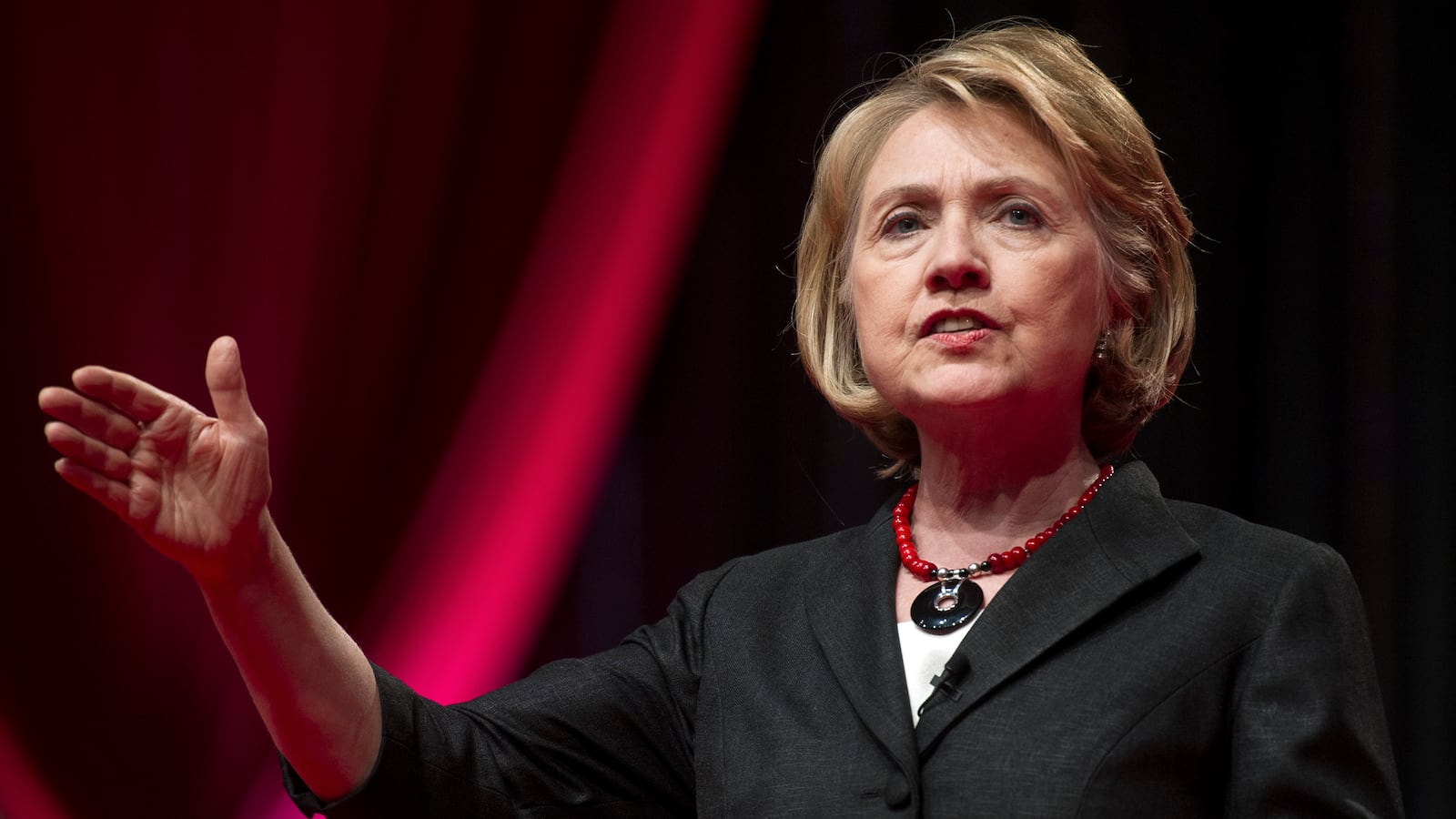At this absurdly early date, no one knows who’ll end up challenging Hillary Clinton for the 2016 Democratic nomination. No one knows how much they’ll make her sweat. But this much we can predict: the challenge will come from the left.
Although few would have predicted it in 1992, Hillary has become the preeminent symbol of Democratic centrism. After 9/11, when conventional wisdom held that Democrats had to be national-security hawks to survive, she backed the Iraq War and the Patriot Act (twice). She solidified that image during the 2008 campaign, when under the influence of Mark Penn, a man deeply unloved by the Democratic base, she tiptoed her way around sensitive issues like drivers’ licenses for illegal immigrants, provoking Barack Obama to accuse her of “trying to sound or vote like Republicans.”

On Iraq, which proved a disaster for Hillary in 2008, Democratic tempers have cooled. But on virtually every other major issue—from gun control to immigration to gay rights to civil liberties to financial regulation—the debate inside the Democratic Party has shifted left over the last five years. And it’s likely to keep shifting left. One reason is the end—at least politically—of the “war on terror,” which has emboldened Democrats to challenge the surveillance policies enacted in 9/11’s wake. Since 2010, according to the Pew Research Center, the percentage of liberal Democrats who say the government has gone too far in restricting civil liberties has jumped 20 points. Younger voters are especially critical of government snooping. Hillary will start the primary process saddled with votes on the Patriot Act and other privacy-related issues that are harder to defend in liberal circles today than they were a decade ago. And opponents will try to make her pay.
The second reason the Democratic debate is moving left is that Democrats no longer fear Republicans. Hillary came of age politically in the ’70s and ’80s, when Richard Nixon and Ronald Reagan taught an entire generation of Democrats about the perils of appearing too liberal. Baby-boom Democrats came to see America as a center-right nation. Today’s Democrats don’t believe that. To the contrary, they see the GOP as clinging to a shrinking and aging white, Anglo base that is less and less able to win national elections. As a result, they’re no longer so concerned about hugging the center.
You can see this most clearly on culture-war issues like guns, immigration, gays, and abortion. In 1992, Bill Clinton went around saying abortion should be “safe, legal, and rare.” In 1993, he was forced to abandon his campaign demand that gays be allowed to serve openly in the military. In 1994, an assault-weapons ban helped lose Democrats the House. Today, by contrast, potential Hillary rivals like Andrew Cuomo and Martin O’Malley are pushing the boldest pro-gay marriage, pro-gun-control agendas they can dream up. In so doing, they hope that their aggressive liberalism will make Hillary—and the Democratic baby boomers she represents--look timid and calculating by comparison, the same contrast Obama managed to paint in 2008.
Finally, the Democratic debate is moving left because the deficit is going down. Throughout Obama’s presidency, his liberal ambitions have been curtailed by the deficits he inherited as a result of Bush’s wars, Bush’s tax cuts and the financial crisis. But according the Congressional Budget Office, the deficit is set to drop from 7 percent of GDP last year to just over 2 percent in 2015. (Although it will eventually go back up). That means that über-liberals like Cuomo and Elizabeth Warren will find it easier to offer big, ambitious spending proposals and the hard-won Clinton reputation for budget balancing may be less in demand.
The Democratic race in 2016 could look a lot like the Democratic race in 2000. By the late ’90s, Bill Clinton’s fiscally conservative policies had helped balance the budget. His crackdowns on crime and welfare had helped blunt Republican culture-war attacks. But precisely because of Clinton’s success, Democrats by the end of his presidency felt emboldened to throw off their inhibitions and dream big. In 2000, Bill Bradley tried to dream bigger than Al Gore. He called for banning racial profiling, repealing mandatory sentencing laws, licensing handguns, and ending discrimination against lesbians and gays. He also served up an ambitious, expensive, universal health-care plan. Bradley scared Gore, but ultimately lost, in part because of Gore’s powers of incumbency, and in part because Bradley—once a proud New Democrat—was not an entirely convincing spokesman for the party’s left wing. In 2016, Hillary’s left-wing challenger may prove stronger, especially if her name is Elizabeth Warren. Then again, Hillary’s a better politician than Gore, with a more loyal team and a more visceral connection to her party’s grassroots.
At this (ridiculously early) juncture, it seems likely Hillary will be able to ride out her party’s lurch to the left. The more realistic danger may be that a lefty challenger forces her into positions that hurt her in the general election. Against Chris Christie, that could be a real worry. Against Ted Cruz or Rand Paul, not so much.






